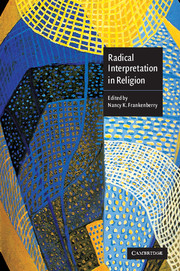Book contents
- Frontmatter
- Contents
- Notes on the contributors
- Preface
- Acknowledgments
- PART I PRAGMATICS
- Introduction
- 1 Saving belief: on the new materialism in religious studies
- 2 Radical interpretation and pragmatism: Davidson, Rorty, and Brandom on truth
- 3 Cultural politics and the question of the existence of God
- 4 Religious belief and naturalism
- PART II CULTURE AND COGNITION
- PART III SEMANTICS
- Select bibliography
- Index
2 - Radical interpretation and pragmatism: Davidson, Rorty, and Brandom on truth
Published online by Cambridge University Press: 13 November 2009
- Frontmatter
- Contents
- Notes on the contributors
- Preface
- Acknowledgments
- PART I PRAGMATICS
- Introduction
- 1 Saving belief: on the new materialism in religious studies
- 2 Radical interpretation and pragmatism: Davidson, Rorty, and Brandom on truth
- 3 Cultural politics and the question of the existence of God
- 4 Religious belief and naturalism
- PART II CULTURE AND COGNITION
- PART III SEMANTICS
- Select bibliography
- Index
Summary
A central question for this volume is what difference Donald Davidson's account of radical interpretation might make for the study of religion. But as compared with what? We are apt to focus initially on Davidson's break from familiar versions of realism and relativism that have strongly influenced religious studies. In thus emphasizing his opposition to a received philosophical tradition, we highlight his similarities to the pragmatists. It is plausible to group these philosophers together, for they are opposing many of the same ideas, and they often echo or borrow each other's arguments. Richard Rorty has made every effort to persuade Davidson, the living philosopher he most admires, to join him behind the banner of pragmatism. The best book on Davidson, Bjorn Ramberg's, places him in close proximity to Rorty's pragmatism. But Davidson has never embraced pragmatism openly, and over the years he and Rorty have criticized one another repeatedly on particular issues. Evidently, there are differences between them that are worth attending to. What they are is less clear.
Perhaps it will help to broaden the range of figures to be compared. In this chapter, I focus primarily on the work of Rorty's former student, Robert Brandom. Part of my purpose is simply to introduce Brandom's work to a religious studies audience. The massiveness and theoretical intricacy of his 1994 book, Making It Explicit, have kept it from having the influence it deserves to have on neighboring fields.
- Type
- Chapter
- Information
- Radical Interpretation in Religion , pp. 25 - 52Publisher: Cambridge University PressPrint publication year: 2002
- 17
- Cited by



